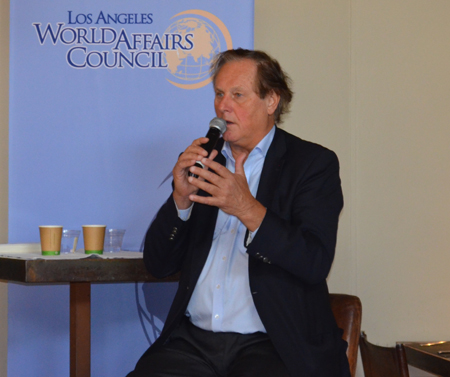
William Drozdiak
German Chancellor Angela Merkel, who just won a fourth term as Germany’s leader in the September 24th elections, did not originally want to run again, and had to be talked into putting her name forward by President Obama, among others, according to William Drozdiak. Speaking to a LAWAC Global Café Breakfast meeting on Tuesday, September 26th, Drozdiak, a senior adviser at McLarty Associates and a former foreign editor of the Washington Post, said that Obama visited Merkel shortly after the US elections last November and found Merkel “tired” and saying she “could not work with President Trump.” Obama had two private dinners with her during which he said she was the only strong leader left in Europe and persuaded her to run one more time – if only to contain the forces of nationalism and populism which seemed on the rise throughout Europe at the time.
Merkel’s party won the largest number of votes, but she still faces the specter of the extreme right-wing AfD party, who won 12.4% of the vote and will be one of the main opposition parties in parliament. “In Germany there has been no wage increase in two decades – and those people ended up voting for the AfD,” said Drozdiak. The AfD started as an anti-Euro party, but after Merkel opened up Germany to roughly one million immigrants, “the AfD changed the nature of their party to capture voter anxiety about immigrants. Now it is the third strongest party in Germany.”
Germany’s experience with rising nationalism and resentment of immigrants mirrors that of the UK with its June 2016 Brexit vote and similar trends in France, Holland, Poland and Hungary. Drozdiak warns that rising income inequality – “the income gap between North and South Europe is worse than 20 years ago” – and anxiety about immigrants, mostly from the Muslim world, will continue to plague Europe. He points out that the population of the Arab world, now 360 million, will jump to 630 million by 2050 and will require annual economic growth of at least 7% in each country just to maintain the current levels of employment – meaning there will be increasing pressure from the Middle East and North Africa to migrate to the richer economies of Europe. After initially opening Germany’s borders, Merkel has reversed her policy and now “she believes we need a Marshall Plan in the Middle East.” But even this attempt to support economies in the Middle East and North Africa – dubbed the European Neighborhood Policy (ENP) fell afoul of internal EU politics. The farm lobby balked at opening Europe’s markets to cheaper agricultural products from across the Mediterranean.
In the UK, Drozdiak says “there is a strong degree of buyer’s remorse” after the Brexit vote. “They are realizing it is going to be much more complex than simply leaving – they have to renegotiate 750 treaties.” So far there have been four rounds of negotiations between the EU and the UK which have achieved nothing. Companies which make parts in the UK and assemble in other European countries still have no idea how it will work out. “It is going to be a huge disruption.”
Following the end of the Cold War the EU expanded to the east and sought good relations with its neighbors. Unfortunately, said Drozdiak, Russian President Putin saw things differently, believing his security can only be guaranteed by destabilizing his neighbors. “Putin wants to pick fights with the West to increase his own popularity.”
As for France, Drozdiak said that the election of Emmanuel Macron this summer was initially greeted with much hope, but some petty scandals and growing confrontation with the labor unions have diminished his standing – including the revelation that he had spent $30,000 on makeup for himself. “He came in like a ball of fire, but now he is acting like all the other politicians”.
On US-European relations, Drozdiak said there was “justified anxiety in the US that after 70 years we are still being called on to be the ultimate security guarantor for our very wealthy allies.” He said there is now an opportunity for Europe to “step up” and take over more of a role in its own security. “The answer does not lie in Europe investing in an aircraft carrier or more nukes. It lies in being smart and sensible to the immediate threats to security, whether it is terrorism, refugees or Russia.” This includes countering the fake news and social media campaigns mounted by Russia to undermine western democratic systems. “There has to be a new strategic outlook in Europe, it has been lacking for many years.” Drozdiak was hopeful that Europe could emerge, paradoxically, as a defender of globalization even as it is tempted to close its borders to outsiders. “Essentially the EU is the world’s greatest experiment in globalization,” he said, with its bid to get rid of internal borders and allow free trade and movement within the EU. “They could lead the rest of the world out of the anti-globalization movement.” He pointed to the great success of the Erasmus program, under which students across Europe can spend one year studying in another country, giving them an opportunity to see the world from a more internationalist perspective from early on. “Europe can re-discover its border-free vocation, but it will need strong leadership – and for now it is only Merkel.”
